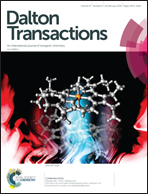Synthesis and catalytic activity of N-heterocyclic silylene (NHSi) cobalt hydride for Kumada coupling reactions†
Abstract
The electron-rich silylene Co(I) chloride 5 was obtained through the reaction of CoCl(PMe3)3 with chlorosilylene. Complex 5 reacted with 1,3-siladiazole HSiMe(NCH2PPh2)2C6H4 to give the silylene Co(III) hydride 6 through chelate-assisted Si–H activation. To the best of our knowledge, complex 6 is the first example of Co(III) hydride supported by N-heterocyclic silylene. Complexes 5 and 6 were fully characterized by spectroscopic methods and X-ray diffraction analysis. Complex 6 was used as an efficient precatalyst for Kumada cross-coupling reactions. Compared with the related complex 3 supported by only trimethylphosphine, complex 6 as a catalyst supported by both chlorosilylene and trimethylphosphine exhibits a more efficient performance for the Kumada cross-coupling reactions. A novel catalytic radical mechanism was suggested and experimentally verified. As an intermediate silylene cobalt(II) chloride 6d was isolated and structurally characterized.



 Please wait while we load your content...
Please wait while we load your content...